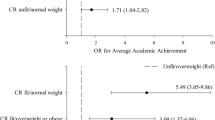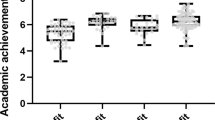Abstract
The aim of our study was to examine the mediation effect of weight status on the association between cardiorespiratory fitness (CRF) and academic performance (AP). Two hundred sixty-nine adolescents (140 boys) aged 13.9 ± 0.3 years old from the DADOS study were included in this cross-sectional analysis. CRF was assessed by the 20-m shuttle run test and estimated maximum oxygen uptake was used in the analysis. AP was assessed through the final academic grades and the Science Research Associates Test of Educational Abilities for assessing reasoning, verbal, and numeric abilities. Weight status was assessed by body mass index (kg/m2). Boot-strapped mediation procedures were performed and indirect effects (IE) with confidence intervals (CI) not including zero were considered statistically significant. Mediation analysis revealed that weight status acted as a mediator of the relationship of CRF with reasoning ability (IE = 0.039; CI = 0.001; 0.091) and the final grades in Math (IE = 0.011; CI = 0.002; 0.025), Language (IE = 0.013; CI = 0.004; 0.027), and GPA (IE = 0.011; CI = 0.003; 0.023).
Conclusions: Our data show that the influence of CRF on academic performance is mediated by weight status in adolescents. We suggest that our data could be considered by educators, families, and policy makers, so that active lifestyles might be promoted when designing programs aimed to improve AP among adolescents.
What is Known: • Academic performance is associated with both, cardiorespiratory fitness and weight status. • The role of weight status in the association between cardiorespiratory fitness and academic performance is poorly understood. | |
What is New: • We support the scarce research investigating the mediating role of weight status as mechanism in the association between fitness and academic performance in youth. • Previous knowledge is expanded by suggesting that cardiorespiratory fitness is related to weight status which in turn may positively influence academic performance in adolescents. |

Similar content being viewed by others
Abbreviations
- AP:
-
Academic performance
- BMI:
-
Body mass index
- CRF:
-
Cardiorespiratory fitness
- GPA:
-
Grade point average
- SD:
-
Standard deviation
- SDS:
-
Standard deviation scores
- SES:
-
Socioeconomic status
- VO2max:
-
Maximum oxygen uptake
References
Abarca-Gómez L, NCD Risk Factor Collaboration (NCD-RisC). Worldwide trends in body-mass index, underweight, overweight, and obesity from 1975 to 2016: a pooled analysis of 2416 population-based measurement studies in 128·9 million children, adolescents, and adults. Lancet 2017;390(10113):2627–2642. doi:https://doi.org/10.1016/S0140-6736(17)32129-3.
Baker JA (2006) Contributions of teacher–child relationships to positive school adjustment during elementary school. J Sch Psychol 44(3):211–229. https://doi.org/10.1016/J.JSP.2006.02.002
Coe DP, Peterson T, Blair C, Schutten MC, Peddie H (2013) Physical fitness, academic achievement, and socioeconomic status in school-aged youth. J Sch Health. 83(7):500–507. https://doi.org/10.1111/josh.12058
Currie C, Molcho M, Boyce W, Holstein B, Torsheim T, Richter M (2008) Researching health inequalities in adolescents: the development of the Health Behaviour in School-Aged Children (HBSC) Family Affluence Scale. Soc Sci Med 66(6):1429–1436. https://doi.org/10.1016/j.socscimed.2007.11.024
Donnelly JE, Hillman CH, Castelli D, Etnier JL, Lee S, Tomporowski P, Lambourne K, Szabo-Reed AN (2016) Physical activity, fitness, cognitive function, and academic achievement in children: a systematic review. Med Sci Sports Exerc 48(6):1197–1222. https://doi.org/10.1249/MSS.0000000000000901
Esteban-Cornejo I, Cadenas-Sanchez C, Vanhelst J, Michels N, Lambrinou CP, González-Gross M, Widhalm K, Kersting M, de la O Puerta A, Kafatos A, Moreno LA, Ortega FB. Attention capacity in European adolescents: role of different health-related factors. The HELENA study. Eur J Pediatr 2017;176(10):1433–1437. doi:https://doi.org/10.1007/s00431-017-3000-2.
French MT, Homer JF, Popovici I, Robins PK (2015) What you do in high school matters: high school GPA, educational attainment, and labor market earnings as a young adult. East Econ J 41(3):370–386. https://doi.org/10.1057/eej.2014.22
Gunnarsdottir T, Njardvik U, Olafsdottir AS, Craighead LW, Bjarnason R (2012) Teasing and social rejection among obese children enrolling in family-based behavioural treatment: effects on psychological adjustment and academic competencies. Int J Obes 36(1):35–44. https://doi.org/10.1038/ijo.2011.181
Haapala EA, Lintu N, Eloranta A-M, Venäläinen T, Poikkeus AM, Ahonen T, Lindi V, Lakka TA (2018) Mediating effects of motor performance, cardiorespiratory fitness, physical activity, and sedentary behaviour on the associations of adiposity and other cardiometabolic risk factors with academic achievement in children. J Sports Sci 9:1–8. https://doi.org/10.1080/02640414.2018.1449562
Hayes AF (2013) Introduction to mediation, moderation, and conditional process analysis: a regression-based approach. The Guilford Press, New York
Herting MM, Nagel BJ (2012) Aerobic fitness relates to learning on a virtual Morris Water Task and hippocampal volume in adolescents. Behav Brain Res 233(2):517–525. https://doi.org/10.1016/j.bbr.2012.05.012
Hillman CH, Khan NA, Kao SC (2015) The relationship of health behaviors to childhood cognition and brain health. Proc Ann Nutr Metab 66(3):1–4. https://doi.org/10.1159/000381237.
Huang T, Tarp J, Domazet SL, Thorsen AK, Karsten F, Andersen LB, Bugge A (2015) Associations of adiposity and aerobic fitness with executive function and math performance in Danish adolescents. J Pediatr 167(4):810–815. https://doi.org/10.1016/j.jpeds.2015.07.009
Kantomaa MT, Stamatakis E, Kankaanpää A, Kaakinen M, Rodriguez A, Taanila A, Ahonen T, Järvelin MR, Tammelin T (2013) Physical activity and obesity mediate the association between childhood motor function and adolescents’ academic achievement. Proc Natl Acad Sci U S A 110(5):1917–1922. https://doi.org/10.1073/pnas.1214574110
Kenney EL, Redman MT, Criss S, Sonneville KR, Austin SB (2017) Are K-12 school environments harming students with obesity? A qualitative study of classroom teachers. Eat Weight Disord 22(1):141–152. https://doi.org/10.1007/s40519-016-0268-6
Lê-Scherban F, Diez Roux AV, Li Y, Morgenstern H (2014) Does academic achievement during childhood and adolescence benefit later health? Ann Epidemiol 24(5):344–355. https://doi.org/10.1016/j.annepidem.2014.02.008
Léger LA, Mercier D, Gadoury C, Lambert J (1988) The multistage 20 metre shuttle run test for aerobic fitness. J Sports Sci 6(2):93–101. https://doi.org/10.1080/02640418808729800
Martin A, Booth JN, McGeown S, Niven A, Sproule J, Saunders DH, Reilly JJ (2017) Longitudinal associations between childhood obesity and academic achievement: systematic review with focus group data. Curr Obes Rep 6(3):297–313. https://doi.org/10.1007/s13679-017-0272-9
Maxwell SE, Cole DA, Mitchell MA (2011) Bias in cross-sectional analyses of longitudinal mediation: partial and complete mediation under an autoregressive model. Multivariate Behav Res 46(5):816–841. https://doi.org/10.1080/00273171.2011.606716
Miller AL, Lee HJ, Lumeng JC (2015) Obesity-associated biomarkers and executive function in children. Pediatr Res 77(1–2):143–147. https://doi.org/10.1038/pr.2014.158.
de Onis M, Onyango AW, Borghi E, Siyam A, Nishida C, Siekmann J (2007) Development of a WHO growth reference for school-aged children and adolescents. Bull World Health Organ 85(9):660–667
Ortega FB, Labayen I, Ruiz JR, Kurvinen E, Loit HM, Harro J, Veidebaum T, Sjöström M (2011) Improvements in fitness reduce the risk of becoming overweight across puberty. Med Sci Sports Exerc 43(10):1891–1897. https://doi.org/10.1249/MSS.0b013e3182190d71
Ortega FB, Ruiz JR, Castillo MJ, Moreno LA, Urzanqui A, González-Gross M, Sjöström M, Gutiérrez A, Group AVENA Study (2008) Health-related physical fitness according to chronological and biological age in adolescents. The AVENA study. J Sports Med Phys Fitness 48(3):371–379
Ortega FB, Ruiz JR, Castillo MJ, Sjöström M (2008) Physical fitness in childhood and adolescence: a powerful marker of health. Int J Obes 32(1):1–11. https://doi.org/10.1038/sj.ijo.0803774
Patton GC, Viner R (2007) Pubertal transitions in health. Lancet 369(9567):1130–1139. https://doi.org/10.1016/S0140-6736(07)60366-3
Reynolds C, Kamphaus R (2004) Behavior assessment system for children, 2nd edn. American Guidance Service, Circle Pines, MN
Santana CCA, Azevedo LB, Cattuzzo MT, Hill JO, Andrade LP, Prado WL (2017) Physical fitness and academic performance in youth: a systematic review. Scand J Med Sci Sport 27(6):579–603. https://doi.org/10.1111/sms.12773
Sardinha LB, Marques A, Martins S, Palmeira A, Minderico C (2014) Fitness, fatness, and academic performance in seventh-grade elementary school students. BMC Pediatr 14(1):176. https://doi.org/10.1186/1471-2431-14-176
Suchert V, Hanewinkel R, Isensee B (2016) Longitudinal relationships of fitness, physical activity, and weight status with academic achievement in adolescents. J Sch Health 86(10):734–741. https://doi.org/10.1111/josh.12424
Tanner JM, Whitehouse RH (1976) Clinical longitudinal standards for height, weight, height velocity, weight velocity, and stages of puberty. Arch Dis Child 51(3):170–179
Thurstone LL, Thurstone TG. TEA Test de Aptitudes Escolares (Scholar Aptitudes Test). Vol 77. 11th ed. Madrid; 2004.
Funding
DADOS Study is funded by the Spanish Ministry of Economy and Competitiveness, MINECO (DEP2013-45515-R) and by the Jaume I University of Castellon, UJI (P1·1A2015-05). This work is partly supported by a Sunny Sport research grant from the Schweppes Suntory Spain Company. M.A.R is supported by a Predoctoral Research Grant from UJI (PREDOC/2015/13).
Author information
Authors and Affiliations
Contributions
María Reyes Beltran-Valls was involved in the data collection and analysis, and drafting of the initial manuscript. Mireia Adelantado-Renau was involved in the data collection and critical revision of the manuscript. Jose Castro-Piñero and Mairena Sánchez-López were involved in the critical revision of the manuscript. Diego Moliner-Urdiales was involved in the study design and data collection, manuscript preparation, and critical revision. All authors have read and approved the final manuscript.
Corresponding author
Ethics declarations
Conflict of interest
The authors declare that they have no conflict of interest.
Informed consent
Informed consent was obtained from all individual participants included in the study.
Ethical approval
The DADOS study protocol was designed in accordance with the ethical guidelines of the Declaration of Helsinki 1961 (last revision of Fortaleza, Brazil, 2013) and was approved by the Research Ethics Committee of the University Jaume I of Castellon.
Additional information
Communicated by Mario Bianchetti
Rights and permissions
About this article
Cite this article
Beltran-Valls, M.R., Adelantado-Renau, M., Castro-Piñero, J. et al. Cardiorespiratory fitness and academic performance association is mediated by weight status in adolescents: DADOS study. Eur J Pediatr 177, 1037–1043 (2018). https://doi.org/10.1007/s00431-018-3159-1
Received:
Revised:
Accepted:
Published:
Issue Date:
DOI: https://doi.org/10.1007/s00431-018-3159-1




